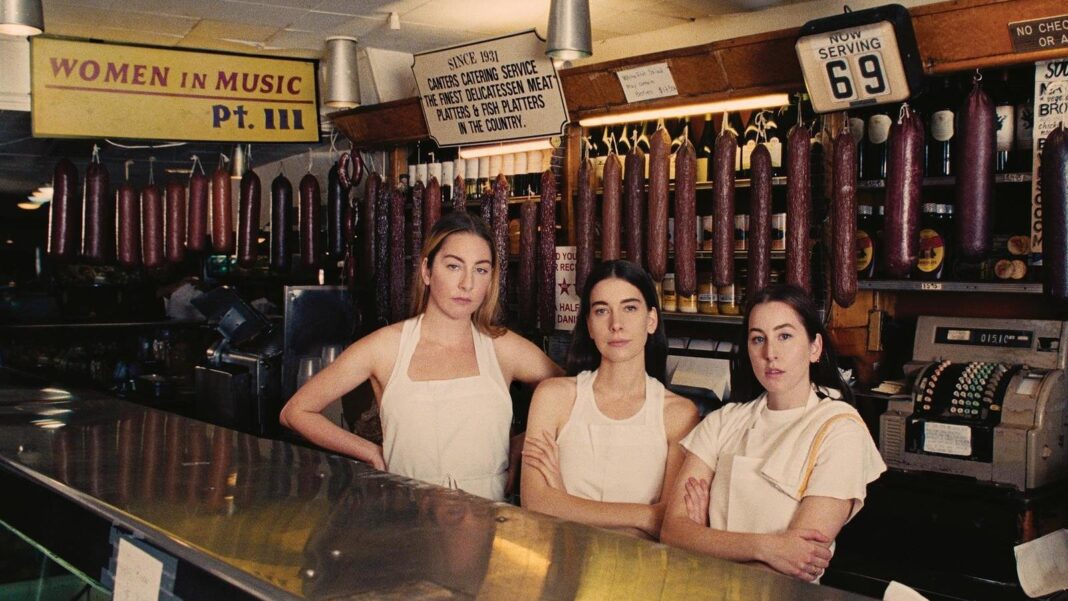Opening and closing their third album with the plaintive call of a saxophone, Haim know that life often goes in cycles. One minute you’re up, the next you’re down; life hands you a third record, and then it deals you a pandemic. One constant through all of it though, is a sense of home. Cut to scene; ‘Women In Music II’I is on the stereo, and ‘Los Angeles’ is the opening vista – all twinkling tropicals and freewheeling jazz, a rediscovered b-side of the La La Land soundtrack. It loves its city, but there are cracks in the glossy veneer. “Hometown of mine”, croons Danielle. “Just got back from the boulevard/Can’t stop crying.”
Indeed, it hasn’t been the easiest of times for Haim. Coronavirus has taken its toll on them the same way it has for many in music – a delayed record, cancelled tour, the emotional strain of trying to pick your way through the debris of your planned-out diary. But their collective pain goes back further than that. Over the past few years, their producer (and Danielle’s partner) Ariel Rechtshaid was diagnosed with testicular cancer, Este wrangled with the health implications of her Type One diabetes, and Alana’s closest friend passed away – all happenings that invoke a complicated mixture of grief, despair and acceptance. Although not all referenced explicitly, these emotions are central to ‘Women In Music III’, giving it a depth that belies its pithy title.
That doesn’t mean there isn’t fun to be had. The playfulness that makes Haim Haim is still in fine evidence, pushed to new places as a result of their experiments with genre. To continue the Californian metaphor, the whole record has the energy of an open-top road trip, switching between stations to see what sticks. All survive the poise of a critical skipping finger, but some experiments linger longer in the mind than others. ‘Up From A Dream’ is at times a little too ‘Spirit In The Sky’ to sit comfortably on the ear, and ‘FUBT’ feels a little like the younger sibling of ‘The Steps’, without packing quite the same punch. ‘Another Try’ also feels a little middle of the highway, pulling itself back slightly with a more interesting third section. But on an album of 16 tracks, there are noticeably more hits than misses – ‘Now I’m In It’ has the same stalking synths that made Taylor Swift’s ‘1989’ so vital, presenting as a break-up song that is actually about the detachment of brain and body that plagued Danielle in a particularly bad bout of depression.
‘Gasoline’ has similar double appeal, a slow-sway which perfectly applies to the sensation of being so deep in the sunken place that you no longer know what you want or need – “I get sad/and I can’t look past what I’m sad about”…”You say you wanna go slow but I wanna go faster”. ‘Summer Girl’, nearly an entire calendar year on from its initial release, still sounds as breezily brilliant as it ever was, focusing on Danielle’s determination to be Rechtshaid’s light in the dark of his early diagnosis. Mostly recovered, it takes on a new resonance of hope, a talisman to carry forth.
Unashamed fans of a choreographed dance, the UK-garage pop of ‘I Know Alone’ is a career home run, managing to sound euphoric and melancholy at the same time in the way that only truly great music can. The east-coast styles of ‘3am’ are equally instant, like something that would have dripped from the acrylic nails of a highly-stylised late 90’s girl-group. The slick answerphone intro is a witty pastiche of the ‘whiny girl on voicemail’ trope that male rappers use in abundance, winding it back on itself to highlight the utter ridiculousness of the motif.
In the vein of knowing humour, ‘Man From The magazine’ presents a bit of a conundrum. Its sparse, disjointed instrumentation feels rough and ready in comparison to the rest of the record, each chord ringing with irritation. You suspect that this is exactly its intention; laying bare the many micro-aggressions of uninspired music journalists and dull record shop owners, it tells the story of patronising ’starter guitars’ and inane, sexualised questions about the infamous ‘bass face’, linking directly back to the album’s eye-rolling title. As an ally listener to their cause, it makes for a tricky moment – on one hand, you have to respect them for making it somewhat unpalatable on purpose, but on the other, you almost wish the message was wrapped up in one of their more radio-friendly bangers, simply because this is a message that deserves to be streamed across A-list playlists worldwide.
While the deepest joys of the record may take a few listens to truly permeate, Haim have succeeded in creating a record that faces life, love and loss with fluidity, the common lyrical thread uniting both upbeat and downtrodden sonics. In many ways, it’s the sound of growing up – outgrowing spaces and relationships, feeling drawn back to familiarities of home, recognising that even in the happiest of love bubbles, you can’t stop the cruel realities of life and death from creeping in. That title may have started as something of a jokey witticism, but instead, it becomes a statement of challenge. Women are every bit as complex as their counterparts, and in allowing space for this complexity, you get music that feels brave, comforting and yes – absolutely essential for our times.







